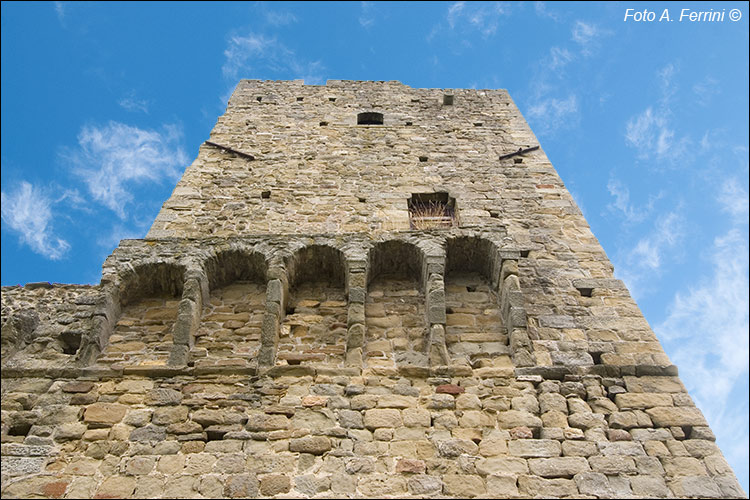Castello di Romena, un simbolo del Medioevo
in Casentino, una bella valle Toscana che puoi conoscere in ogni suo dettaglio con questo sito
Italiano
HA ISPIRATO L’INFERNO DI DANTE
Questa immagine mostra il camminamento sulla Torre delle Prigioni del Castello di Romena che permetteva di raggiungere la piccola porta, unico accesso alla torre. Il camminamento era parte di quello costruito per la guardia del castello e che fiancheggiava internamente i merli delle mura. La piccola porta dava accesso alla sala delle sentenze. Qui si giudicavano gli indiziati dei reati e si stabiliva la condanna che meritavano. Sotto la sala vi erano tre piani ancora testimoniati dai fori nelle pareti dove erano poste le travi che sostenevano i piantiti. Attraverso delle botole i condannati erano calati in basso. A piani più bassi corrispondevano condanne più pesanti, fino a quella di morte che sopraggiungeva per fame e freddo. Gli altri prigionieri assistevano a queste orrende morti. Era un bel deterrente per non infrangere la giustizia. Si è ipotizzato che questa prigione abbia ispirato Dante Alighieri per l’inferno della Divina Commedia. Il Sommo Poeta fu ospite dei Guidi in questo castello nei primi anni del Trecento. This image shows the walkway on the Tower of the Prisons of the Castle of Romena that allowed to reach the small door, the only access to the tower. The walkway was part of the one built for the guard of the castle and which flanked internally the battlements of the walls. The small door gave access to the sentencing room. Here the suspects of the crimes were judged and the sentence they deserved was established. Under the hall there were three floors still testified by the holes in the walls where the beams that supported the floors were placed. Through the hatches the condemned were lowered down. Lower floors corresponded to heavier sentences, up to that of death that came from hunger and cold. The other prisoners witnessed these horrendous deaths. It was a nice deterrent not to break justice. It has been speculated that this prison inspired Dante Alighieri for the hell of the Divine Comedy. The Supreme Poet was a guest of the Guidi in this castle in the early years of the fourteenth century.










































